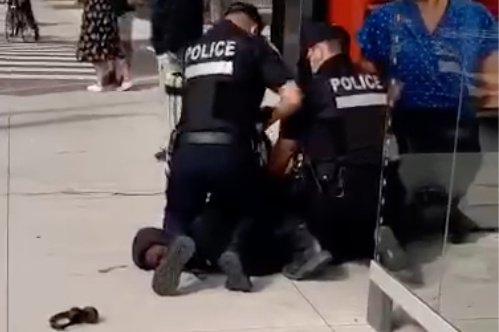Leaders call on the provincial government to act

A little over one month after a controversial police intervention among two black Villeray teenagers, Québec Solidaire and Maison d’Haiti are asking for concrete action to address racial profiling.
Québec Solidaire MNA for Laurier-Dorion Andrés Fontecilla along with the general director of Maison d’Haïti Marjorie Villefranche, made a statement in front of George-Vanier high school last Thursday to demand that more be done to rectify unjust racial profiling of black people by police.
They directed their comments directly at the Minister of Public Safety Genevieve Guilbault,
asking the government to put in place measures that would prohibit arrests without cause and favour social intervention among young people.
Violent arrest
On Jun. 10, Montreal police officers were filmed arresting two black teenagers, where officers had knelt on their necks and pressed their faces against the pavement. The teens involved were students of Villeray high school Louis-Joseph-Papineau, still dressed in their uniforms.
The police later said they were responding to reports of a largescale fight and claimed that the teens had not been cooperating. The SPVM is currently investigating whether or not the officer’s actions were justified.
The video sent shockwaves across the city and province as many compared it to the now-infamous video of the murder of George Floyd by police officer Derek Chauvin in Minneapolis last year.
“The muscular immobilization of the two young adolescents is a blatant example of the racial profiling of black people, especially young people,” read a statement on the matter issued by the Fontecilla and Villefranche.
“Criminalizing young blacks is unacceptable, here as elsewhere,”
Treated like criminals
“The young people who were arrested last month have been attending Maison d’Haïti for years,” said Villefranche, who runs one of the largest community centers in the area.
“Unfortunately, with such arrests, the image that the police wrongly convey to the population is that these young people are criminals,” she deplored, adding that the youth in question are in fact integral parts of their community.
Both Fontecilla and Villefranche deplored the disproportionate response by the officers, further stating that black youth are treated more aggressively and more violently due to the colour of their skin.
“Criminalizing young blacks is unacceptable, here as elsewhere,” said Villefranche, condemning the police and adding that “they did not deserve to undergo such treatment.”

A change to the status quo
The two leaders therefore demanded that the provincial government do more to address this problem, which they say has not changed and never been addressed seriously.
Both asked that Minister Guilbault “break the status quo” around police interactions with black youth and implement new approaches when intervening with them.
“There needs to be a less repressive approach,” stated Fontecilla, adding, he would prefer to see social workers using mediation tactics with youth instead of police officers using force.
He added that the Public Safety Minister had to put a stop to random checks without motive.
“Police interventions like the one that took place at École Georges-Vanier only widen the gap of mistrust between youth and the police,” added Fontecilla.
Restraint technique
Although CAQ leader François Legault had previously expressed his discomfort in seeing such images and his desire “for it to not happen again,” his Public Safety Ministry refused to comment.
Camille Simard, a spokesperson for the ministry told CBC that they would not comment on the ongoing case and instead added that the teens could “file a police complaint.”
Simard nonetheless added that police were trained to use such techniques to immobilize the “axes “their axes of rotation, either at the top of the shoulders or at the hips.”
Moving forward
“To immobilize them and humiliate them by putting their face to the floor, I want it to stop. I want it to stop in Black communities because we have been sufficiently traumatized by this kind of thing and I cannot understand that police officers still thought they could do this,” said Villefranche of the apprehension.
“Not only do these arrests stigmatize these communities in society, but they also break the bond of trust between people of colour and our police forces,” commented Fontecilla, adding that it was “unacceptable that people from black and indigenous communities are up to five times more likely to be arrested at random.”
The comments came the same week as Mayor Valérie Plante announced that if she was re-elected, police would be outfitted with body cameras in 2022. Plante had also condemned the actions of the SPVM and asked them to clarify what had happened
“They are still in shock and the kids are traumatized,” said Villefranche on the teens arrested, who are currently seeking legal action.










